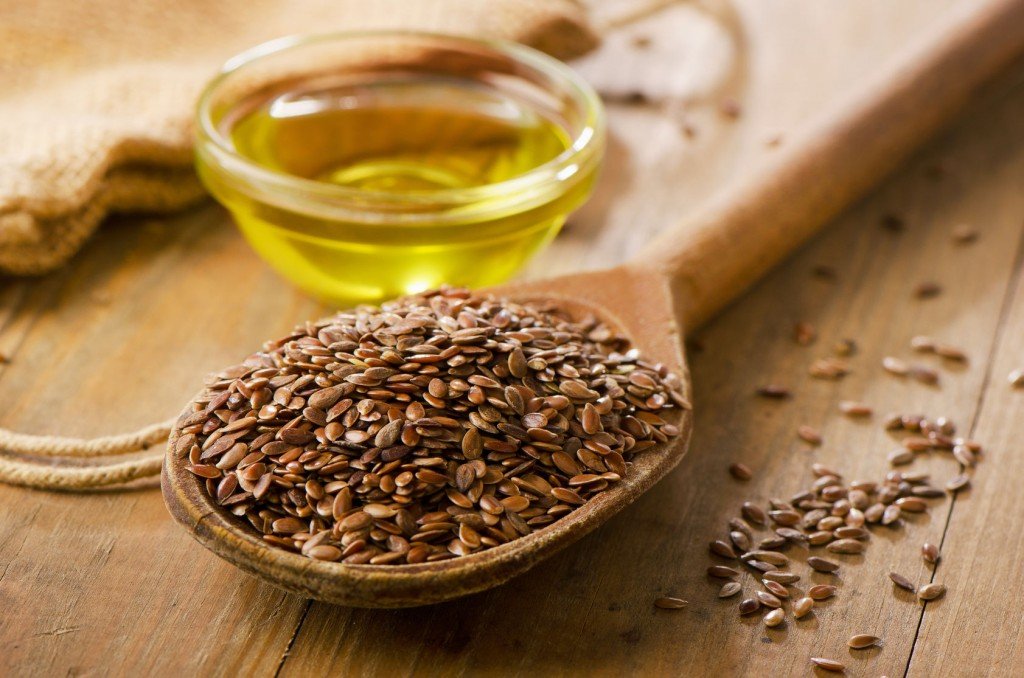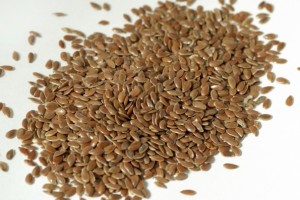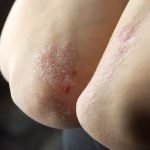Flaxseed lignans offer a simple, effective and inexpensive way to decrease the risk of and aid in the treatment of breast cancer. Unfortunately, women with breast cancer are frequently advised to avoid flaxseeds. It seems this notion comes from research looking at soy isoflavones and has been wrongfully attributed to another form of phytoestrogen, flaxseed lignans. It is important to recognize that this notion is misplaced and overwhelmingly contradicted by the scientific evidence to date.
Research Results
Research suggesting the avoidance of flaxseed lignans is minimal and poor at best. Two in vitro studies found that isolated enterolactone could both stimulate and inhibit the growth hormone-dependent breast cancer cells (Welshons et al., 1987; Mousavi and Adlercreutz, 1992). Interestingly, higher levels of enterolactone had cytotoxic effects on breast cancer cells while leaving healthy cells unharmed. These cancer-destroying effects could not be reversed by increasing amounts of estradiol, suggesting that enterolactone’s inhibitory effects were not antiestrogenic.
Recently researchers found that rats exposed to defatted flaxseed diets in the womb developed slightly more mammary cancers than the offspring of rats consuming a regular diet (Khan et al., 2007; Yu et al., 2006). Yet, similar studies using unprocessed flaxseeds found favorable mammary changes (Ward et al., 2000; Tou and Thompson, 1999) and a significant reduction of mammary tumors in rat offspring (Chen et al., 2003).
Apart from a few ambiguous reports, the majority of the scientific literature consistently tells a similar story. Numerous studies have looked at human breast cancers implanted into animals (Zhang et al., 2007; Chen et al., 2007a, b; Bergman et al., 2007; Power et al., 2006; Wang et al., 2005; Chen et al., 2004; Chen et al., 2002; Dabrosin et al., 2002; Chen and Thompson, 2003), or chemically induced breast cancers (Saarinen et al., 2002). Without exception, all of these studies have shown that flaxseed lignans powerfully inhibit tumor growth and metastasis in both estrogen receptor positive and receptor negative breast cancers. Since hormone-independent breast cancers are also strongly inhibited, it appears the ways in which flaxseeds fight against cancer are greater than the competitive binding of weak phytoestrogens to estrogen receptors.
Tamoxifen
Clinicians unfamiliar with the substantial number of studies looking at the effects of flaxseed lignans on breast cancer often assume they will interfere with the effectiveness of the estrogen antagonist drug tamoxifen. As such, breast cancer patients who take this medication are commonly asked to avoid flaxseeds. However, several studies have looked at this issue and all of them have found the exact opposite to be true. Indeed, flaxseed lignans powerfully enhance the effectiveness of tamoxifen (Chen et al., 2007a, 2007b; Chen et al., 2004; Chen and Thompson, 2003). In one study, human breast cancer cells were implanted into pre- and post-menopausal mouse models. In the low estrogen group, tumor size was ultimately unchanged with tamoxifen treatment. When tamoxifen and flaxseed treatments were combined, however, there was a 54% reduction in tumor size. Incredibly, the mice treated with a 10% flaxseed diet alone had a 74% reduction in breast tumor size! Another conclusion might be that tamoxifen reduces the effectiveness of flaxseeds.
A side effect of tamoxifen in low-estrogen mice was a 39% increase in uterine size. You might recall that tamoxifen increases the risk of uterine cancer in women by almost eight-fold (Ferguson et al., 2005). Amazingly, not only did flaxseed lignans enhance the effectiveness of tamoxifen, but they also significantly reduced the uterine growth induced by the drug. There was no abnormal uterine growth in animals treated with flax alone. In the high-dose estrogen animals, both treatments significantly inhibited tumor growth. However, growth inhibition increased from 41% for tamoxifen treatment alone to 50% inhibition when combined with flaxseeds (Chen et al., 2004).
Other Studies
Soy isoflavones have been shown to increase the growth of breast tumors in post-menopausal animal models. This has resulted in the widespread avoidance of soy among women with post-menopausal breast cancer. Interestingly, in several studies, flaxseed lignans have been shown to halt the growth-stimulating effects of soy on human breast cancers implanted in mice (Power et al., 2006; Power and Thompson, 2007; Saarinen et al., 2006; Power et al., 2006). The authors of one study suggest, “This may indicate that if soy is consumed with lignan-rich foods, it may continue to induce its other beneficial health effects, without inducing adverse effect on postmenopausal breast cancer” (Power and Thompson, 2007).
An impressive study looked at women recently diagnosed with breast cancer (Thompson et al., 2005). Each day for the three weeks before their breast surgery, the patients consumed a muffin containing 25g of flaxseed (four tablespoons) or a regular muffin. Compared with women eating plain muffins, the breast tumors of the women consuming flaxseed lignans daily showed a 31% increase in apotosis, a 34% decrease in tumor proliferation and a 71% decrease in HER-2/neu expression. The last of these is associated with aggressive cancer growth, a higher likelihood of metastasis, greater chance of cancer recurrence and decreased survival. These are astounding results – seen in only three weeks – using a simple dietary change.
Several other studies have shown that flaxseed lignans significantly and beneficially alter the way the liver metabolizes estrogens. Women consuming ground flaxseeds daily dramatically increased their 2-OH/16-OH estrone ratios (Haggan et al., 2000; Haggans et al., 1999; Brooks et al., 2004). This change is widely associated with a decreased risk of breast cancer (Kabat et al., 2006).
A number of studies are looking at the incidence of breast cancer in women and their intake of dietary flaxseed lignans. While some studies find no association (Verheus, 2007; Kilkkinen et al., 2004), the majority show up to a 62% reduction in the risk of breast cancer among women consuming the greatest amount of flaxseed lignans (Touillaud et al., 2007; Piller et al., 2006; Olsen et al., 2004; McCann et al., 2004; Linseisen et al., 2004; Boccardo et al., 2004; Ingram et al., 1997; Pietinen et al., 2001).
Women who carry a variant of the CYP17 gene have higher levels of sex hormones and an increased risk for breast cancer. Studies have found that women with these high-risk genes who consume the greatest quantity of dietary flax lignans dramatically reduce their risk of breast cancer by up to 70% (Piller et al., 2006; McCann et al., 2002).
The evidence thus far is clear and overwhelmingly without contradiction: Women with a history of breast cancer will very likely gain substantial anti-cancer benefits by increasing their consumption of flaxseed lignans.
 Michael Uzick, NMD received his doctorate from Bastyr University. While in medical school he completed internships in cancer, training at Cancer Treatment Centers of America in Seattle and at the Bio-Medical (Hoxey) clinic in Tijuana. His clinical training also included specialty shifts at Bastyr’s Immune Wellness clinic. He has published articles on complementary medicine in such journals as Integrative Cancer Therapies and Alternative Medicine Review. He is a frequent lecturer on alternative therapies for cancer, hepatitis C and environmental toxicity; is a member of OncANP and the AANP; and served as the Naturopathic Medical Director for the Southern Arizona AIDS Foundation for four years.
Michael Uzick, NMD received his doctorate from Bastyr University. While in medical school he completed internships in cancer, training at Cancer Treatment Centers of America in Seattle and at the Bio-Medical (Hoxey) clinic in Tijuana. His clinical training also included specialty shifts at Bastyr’s Immune Wellness clinic. He has published articles on complementary medicine in such journals as Integrative Cancer Therapies and Alternative Medicine Review. He is a frequent lecturer on alternative therapies for cancer, hepatitis C and environmental toxicity; is a member of OncANP and the AANP; and served as the Naturopathic Medical Director for the Southern Arizona AIDS Foundation for four years.
References
- Welshons WV et al: Stimulation of breast cancer cells in vitro by the environmental estrogen enterolactone and the phytoestrogen equol, Breast Cancer Res Treat Nov;10(2):169-75, 1987.
- Mousavi Y, Adlercreutz H: Enterolactone and estradiol inhibit each other’s proliferative effect on MCF-7 breast cancer cells in culture, J Steroid Biochem Mol Biol Mar;41(3-8):615-9, 1992.
- Khan G et al: Maternal flaxseed diet during pregnancy or lactation increases female rat offspring’s susceptibility to carcinogen-induced mammary tumorigenesis, Reprod Toxicol Apr-May;23(3):397-406, 2007.
- Yu B et al: Maternal dietary exposure to fiber during pregnancy and mammary tumorigenesis among rat offspring, Int J Cancer Nov 15;119(10):2279-86, 2006.
- Ward WE et al: Exposure to flaxseed or purified lignan during lactation influences rat mammary gland structures, Nutr Cancer 37:187-92, 2000.
- Tou JC, Thompson LU: Exposure to flaxseed or its lignan component during different developmental stages influences rat mammary gland structures, Carcinogenesis 20:1831-5, 1999.
- Chen J et al: Exposure to flaxseed or its purified lignan during suckling inhibits chemically induced rat mammary tumorigenesis, Exp Biol Med (Maywood) 228:951-8, 2003.
- Zhang LY et al: Regulation of zinc transporters by dietary flaxseed lignan in human breast cancer xenografts, Mol Biol Rep Sep 5, 2007.
- Chen J et al: Flaxseed alone or in combination with tamoxifen inhibits MCF-7 breast tumor growth in ovariectomized athymic mice with high circulating levels of estrogen, Exp Biol Med (Maywood) Sep;232(8):1071-80, 2007a.
- Bergman Jungestrom M et al: Flaxseed and its lignans inhibit estradiol-induced growth, angiogenesis, and secretion of vascular endothelial growth factor in human breast cancer xenografts in vivo, Clin Cancer Res Feb 1;13(3):1061-7, 2007.
- Chen J et al: Dietary flaxseed interaction with tamoxifen induced tumor regression in athymic mice with MCF-7 xenografts by downregulating the expression of estrogen related gene products and signal transduction pathways, Nutr Cancer 58(2):162-70, 2007b.
- Power KA et al: Mammalian lignans enterolactone and enterodiol, alone and in combination with the isoflavone genistein, do not promote the growth of MCF-7 xenografts in ovariectomized athymic nude mice, Int J Cancer Mar 1;118(5):1316-20, 2006.
- Wang L et al: The inhibitory effect of flaxseed on the growth and metastasis of estrogen receptor negative human breast cancer xenograftsis attributed to both its lignan and oil components, Int J Cancer Sep 20;116(5):793-8, 2005.
- Chen J et al: Dietary flaxseed enhances the inhibitory effect of tamoxifen on the growth of estrogen-dependent human breast cancer (mcf-7) in nude mice, Clin Cancer Res Nov 15;10(22):7703-11, 2004.
- Chen J et al: Dietary flaxseed inhibits human breast cancer growth and metastasis and downregulates expression of insulin-like growth factor and epidermal growth factor receptor, Nutr Cancer 43(2):187-92, 2002.
- Dabrosin C et al: Flaxseed inhibits metastasis and decreases extracellular vascular endothelial growth factor in human breast cancer xenografts, Cancer Lett Nov 8;185(1):31-7, 2002.
- Chen J, Thompson LU: Lignans and tamoxifen, alone or in combination, reduce human breast cancer cell adhesion, invasion and migration in vitro, Breast Cancer Res Treat Jul;80(2):163-70, 2003.
- Saarinen NM et al: Enterolactone inhibits the growth of 7,12-dimethylbenz(a)anthracene-induced mammary carcinomas in the rat, Mol Cancer Ther Aug;1(10):869-76, 2002.
- Ferguson SE et al: Comparison of uterine malignancies that develop during and following tamoxifen therapy, Gynecol Oncol May;101(2):322-6, 2006.
- Power KA, Thompson LU: Can the combination of flaxseed and its lignans with soy and its isoflavones reduce the growth stimulatory effect of soy and its isoflavones on established breast cancer?, Mol Nutr Food Res Jul;51(7):845-56, 2007.
- Saarinen NM et al: Flaxseed attenuates the tumor growth stimulating effect of soy protein in ovariectomized athymic mice with MCF-7 human breast cancer xenografts, Int J Cancer Aug 15;119(4):925-31, 2006.
- Power KA et al: Genistein alone and in combination with the mammalian lignans enterolactone and enterodiol induce estrogenic effects on bone and uterus in a postmenopausal breast cancer mouse model, Bone Jul;39(1):117-24, 2006.
- Thompson LU et al: Dietary flaxseed alters tumor biological markers in postmenopausal breast cancer, Clin Cancer Res May 15;11(10):3828-35, 2005.
- Haggans CJ et al: The effect of flaxseed and wheat bran consumption on urinary estrogen metabolites in premenopausal women, Cancer Epidemiol Biomarkers Prev Jul;9(7):719-25, 2000.
- Haggans CJ et al: Effect of flaxseed consumption on urinary estrogen metabolites in postmenopausal women, Nutr Cancer 33(2):188-95, 1999.
- Brooks JD et al: Supplementation with flaxseed alters estrogen metabolism in postmenopausal women to a greater extent than does supplementation with an equal amount of soy, Am J Clin Nutr Feb;79(2):318-25, 2004.
- Kabat GC et al: Estrogen metabolism and breast cancer, Epidemiology Jan;17(1):80-8, 2006.
- Verheus M et al: Plasma phytoestrogens and subsequent breast cancer risk, J Clin Oncol Feb 20;25(6):648-55, 2007.
- Kilkkinen A et al: Serum enterolactone concentration is not associated with breast cancer risk in a nested case-control study, Int J Cancer Jan 10;108(2):277-80, 2004.
- Touillaud MS et al: Dietary lignan intake and postmenopausal breast cancer risk by estrogen and progesterone receptor status, J Natl Cancer Inst Mar 21;99(6):475-86, 2007.
- Piller R et al: Plasma enterolactone and genistein and the risk of premenopausal breast cancer, Eur J Cancer Prev Jun;15(3):225-32, 2006.
- Olsen A et al: Plasma enterolactone and breast cancer incidence by estrogen receptor status, Cancer Epidemiol Biomarkers Prev Dec;13(12):2084-9, 2004.
- McCann SE et al: Dietary lignan intakes and risk of pre- and postmenopausal breast cancer, Int J Cancer Sep 1;111(3):440-3, 2004.
- Linseisen J et al: Dietary phytoestrogen intake and premenopausal breast cancer risk in a German case-control study, Int J Cancer Jun 10;110(2):284-90, 2004.
- Boccardo F et al: Serum enterolactone levels and the risk of breast cancer in women with palpable cysts, Eur J Cancer Jan;40(1):84-9, 2004.
- Ingram D et al: Case-control study of phyto-oestrogens and breast cancer, Lancet Oct 4;350(9083):990-4, 1997.
- Pietinen P et al: Serum enterolactone and risk of breast cancer: a case-control study in eastern Finland, Cancer Epidemiol Biomarkers Prev Apr;10(4):339-44, 2001.
- Piller R et al: CYP17 genotype modifies the association between lignan supply and premenopausal breast cancer risk in humans, J Nutr Jun;136(6):1596-603, 2006.
- McCann SE et al: The risk of breast cancer associated with dietary lignans differs by CYP17 genotype in women, J Nutr Oct;132(10):3036-41, 2002.






